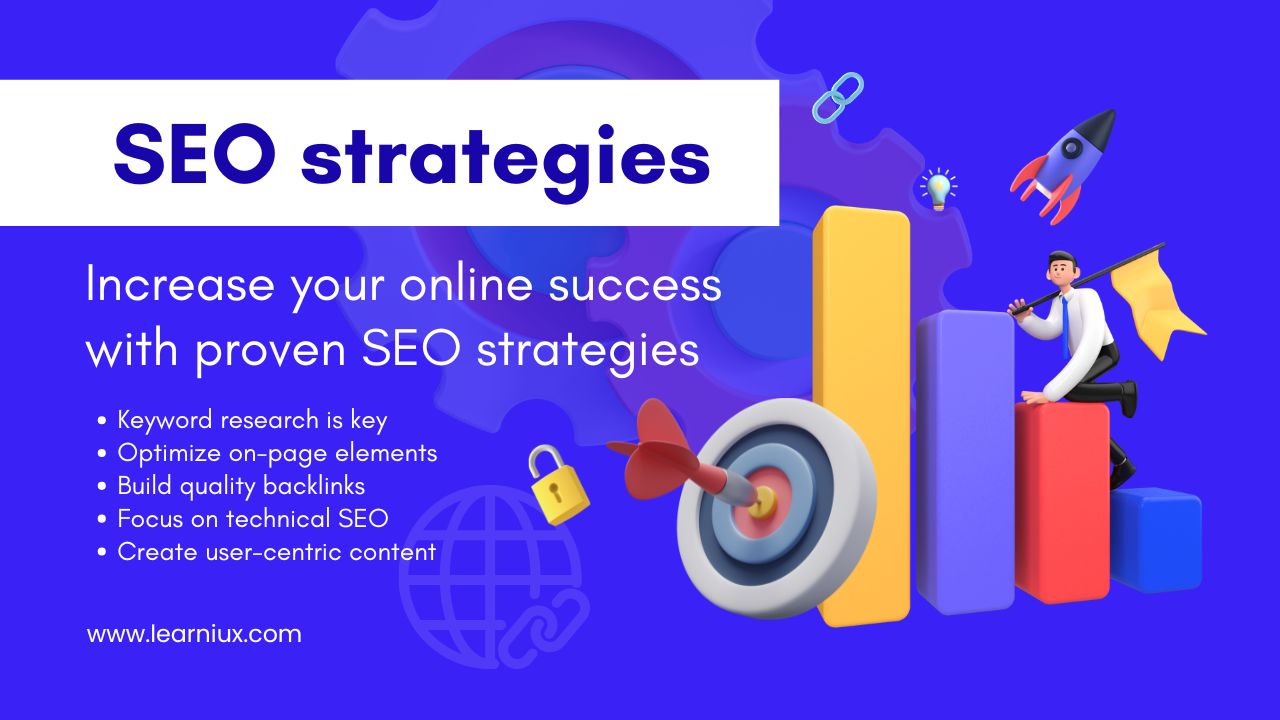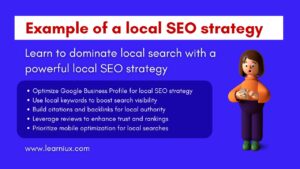Search Engine Optimization (SEO) strategies are essential for improving a website’s visibility in search engine results. By implementing effective SEO strategies, businesses and individuals can increase organic traffic, increase user engagement, and achieve better rankings on Google, Bing, and other search engines. In this comprehensive guide, we explore basic and advanced SEO strategies to optimize your digital presence, leading to long-term success in an ever-evolving online landscape.
Introduction
In today’s digital age, SEO strategies are the cornerstone of online visibility. These strategies include a variety of techniques designed to align your website with search engine algorithms while providing value to users. Whether you’re a small business owner, content creator, or digital marketer, understanding and implementing SEO strategies can significantly impact your online growth.
This guide provides actionable insights into SEO strategies that cover everything from keyword research to technical optimization. By focusing on user-centric and search-engine-friendly SEO strategies, you can build a sustainable online presence.
Why SEO Strategies Matter
SEO strategies are important because they help websites rank higher in search engine results pages (SERPs), making it easier for potential customers to find you. Effective SEO strategies go beyond just rankings; they improve user experience, build trust, and increase conversions. Without well-thought-out SEO strategies, even the best content can go unnoticed.
For example, businesses that prioritize SEO strategies often see a significant increase in organic traffic, which is cost-effective compared to paid advertising. Furthermore, SEO strategies ensure that your website remains competitive in a crowded digital space.

Key Elements of SEO Strategies
To create effective SEO strategies, start with the fundamental elements. These key elements form the foundation of any successful SEO campaign.
Keyword Research in SEO Strategies
Keyword research is the foundation of effective SEO strategies. It involves identifying the terms and phrases that your target audience uses when searching for products, services, or information. By incorporating these keywords into your content, you align your website with user intent, which is an important aspect of SEO strategies.
To conduct keyword research for SEO strategies, use tools like Google Keyword Planner, SEMrush, or Ahrefs. Focus on long-tail keywords, which are more specific and less competitive, as they often yield better results in SEO strategies. For example, instead of targeting “shoes,” target “best running shoes for women” to attract a more focused audience.
Once you’ve identified relevant keywords, incorporate them naturally into your content, titles, and meta descriptions as part of your SEO strategies. Avoid keyword stuffing, as it can hurt your rankings and user experience.
On-Page Optimization for SEO Strategies
On-page optimization refers to techniques used directly to improve your website’s search engine ranking. It is a key component of SEO strategies and includes optimizing elements such as titles, headings, meta descriptions, and images.
To effectively implement on-page SEO strategies:
- Craft catchy title tags: Include your primary keyword in the title and keep it under 60 characters to ensure it is fully displayed in the SERPs.
- Write descriptive meta descriptions: Summarize your content in 160 characters or less by including relevant keywords to increase click-through rates.
- Use header tags (H1, H2, H3): Structure your content with headers to improve readability and keyword placement, which is an important part of SEO strategies.
- Optimize images: Use descriptive file names and alt text with keywords to increase accessibility and support your SEO strategies.
By focusing on these on-page elements, your SEO strategies will align with both search engine algorithms and user expectations.
Advanced SEO Strategies
Once you’ve mastered the basics, advanced SEO strategies can help you stay ahead of the competition. These techniques require a deep understanding of search engine behavior and user trends.
Content Creation and SEO Strategies
Content is the core of SEO strategies. High-quality, relevant, and engaging content attracts users and signals to search engines that your website is valuable. To create content that aligns with SEO strategies:
- Focus on user intent: Understand what your audience is looking for and create your content to meet those needs.
- Create comprehensive content: Like this guide, long-form content often performs well in SEO strategies because it covers topics in depth.
- Include multimedia: A key component of successful SEO strategies, use images, videos, and infographics to increase engagement.
Update your content regularly to keep it fresh and relevant, as this is a proven tactic in SEO strategies. For example, updating a blog post with new data or insights can improve rankings over time.
Building Backlinks as Part of SEO Strategies
Backlinks or inbound links from other websites are a powerful signal of authority in SEO strategies. Search engines view backlinks as a vote of confidence, indicating that your content is trustworthy and valuable.
To build backlinks for your SEO strategies:
- Create link-worthy content: Publish in-depth guides, case studies, or unique research that others want to reference.
- Guest blogging: Write for reputable websites in your niche and include links back to your site.
- Engage in outreach: Reach out to bloggers and website owners to promote your content and solicit backlinks.
Focus on quality over quantity in your backlink SEO strategies. A few high-authority links are more valuable than numerous low-quality links.
Technical SEO Strategies
Technical SEO strategies focus on optimizing the backend of your website so that it is accessible to search engines and provides a seamless user experience.
Improving Site Speed in SEO Strategies
Site speed is an important factor in SEO strategies because it affects user satisfaction and search engine rankings. A slow-loading website can increase bounce rates and reduce conversions, which can undermine your SEO strategies.
To improve site speed as part of your SEO strategies:
- Optimize images: Compress images without sacrificing quality using tools like TinyPNG.
- Enable browser caching: Store static files to reduce load times for returning visitors.
- Minify code: Remove unnecessary CSS, JavaScript, and HTML to streamline your site.
Tools like Google PageSpeed Insights can help you identify areas to improve your site speed SEO strategies.
Mobile Optimization for SEO Strategies
Since a significant portion of web traffic comes from mobile devices, mobile optimization cannot be overlooked in SEO strategies. A mobile-friendly website ensures that users can navigate and engage with your content on any device.
To optimize for mobile in your SEO strategies:
- Adopt responsive design: Ensure that your website adjusts seamlessly to different screen sizes.
- Make navigation easy: Use clear menus and buttons that are easy to tap on mobile devices.
- Test mobile usability: Use Google’s mobile-friendly test to identify issues and refine your SEO strategies.
Mobile optimization is not just a trend, but a key pillar of modern SEO strategies.
Measuring the Success of an SEO Strategy
To determine the effectiveness of your SEO strategy, track key performance indicators (KPIs) using analytics tools. This allows you to measure progress and make data-driven adjustments.
Tools to Analyze Your SEO Strategy
A number of tools can help you monitor and refine your SEO strategy:
- Google Analytics: Track organic traffic, user behavior, and conversions to evaluate your SEO strategy.
- Google Search Console: Monitor keyword performance, click-through rate, and indexing issues to optimize your SEO strategy.
- Third-party tools: Platforms like SEMrush and Moz provide deep insights into the performance of your SEO strategy.
Regularly review metrics like organic traffic, bounce rate, and conversion rate to ensure your SEO strategy is getting results.
Common SEO Strategy Mistakes
Even the best SEO strategies can fail if you fall into common traps. Avoid these mistakes to increase your success.
How to Avoid SEO Strategy Mistakes
Some common SEO strategy mistakes include:
- Keyword Stuffing: Overusing keywords can lead to penalties and harm the user experience. Use keywords naturally in your SEO strategies.
- Ignoring User Intent: Content that doesn’t address what users are looking for will struggle to rank. Align your SEO strategies with user needs.
- Ignoring Technical SEO: Failing to address issues like broken links or slow load times can weaken your SEO strategies.
To avoid these mistakes, focus on quality, relevance, and user satisfaction in your SEO strategies. Conduct regular audits to identify and fix problems quickly.
Future-Proof Your SEO Strategies
Search engine algorithms are constantly evolving, so your SEO strategies need to adapt to stay effective. Stay informed about industry trends and updates to keep your SEO strategies relevant.
Integrate AI into SEO strategies
Artificial intelligence (AI) is transforming SEO strategies by offering new ways to optimize content and analyze data. AI tools can help with:
- Content generation: Create drafts or ideas for content that align with your SEO strategies.
- Keyword analysis: Identify trending keywords and predict their performance in SEO strategies.
- User behavior insights: Analyze patterns to refine your SEO strategies.
However, use AI responsibly as a complement to human creativity in your SEO strategies, not a replacement. Over-reliance on AI can lead to mediocre content failing to engage users.
Expanding Your SEO Strategies Globally
If your business targets an international audience, global SEO strategies are essential. These strategies include optimization for different languages, regions, and search engines.
Local SEO Strategies for Global Reach
Local SEO strategies are important for businesses that have a physical presence or target specific regions. To implement local SEO strategies:
- Optimize for local keywords: Include location-specific terms in your content as part of your SEO strategies.
- Create a Google My Business Profile: Increase visibility in local search results with accurate business information.
- Encourage reviews: Positive customer reviews build credibility and support your local SEO strategies.
Multilingual SEO Strategies
For websites that target multiple languages, multilingual SEO strategies are important. Use hreflang tags to indicate language and regional targeting to search engines. Translate content accurately and ensure it matches cultural nuances to maximize the effectiveness of your SEO strategies.
SEO Strategies for E-Commerce
E-commerce websites need optimized SEO strategies to increase sales and compete in a crowded marketplace.
Product Page Optimization in SEO Strategies
Optimize product pages as part of your SEO strategies by:
- Using descriptive titles: Include product names and relevant keywords.
- Writing detailed descriptions: Highlight features and benefits while naturally including keywords.
- Adding high-quality images: Use alt text with keywords to support your SEO strategies.
Category Page SEO Strategies
Category pages are often overlooked but are crucial to e-commerce SEO strategies. Optimize them with:
- Keyword-rich titles and descriptions: Help search engines understand the purpose of the page.
- Internal linking: Connect category pages to related products to enhance navigation and SEO strategies.
Voice Search and SEO Strategies
With the rise of voice assistants like Siri and Alexa, optimizing for voice search is a growing aspect of SEO strategies.
Optimizing for voice search in SEO strategies
Voice search queries are often long and conversational, so adapt your SEO strategies to:
- Targeting long-tail keywords: Focus on phrases that users are likely to say, such as “best coffee shops near me”.
- Using natural language: Write content that reflects how people speak to align with voice search SEO strategies.
- Providing concise answers: Optimize for featured snippets, as voice assistants often extract answers from them.
Video Content in SEO Strategies
Video content is becoming increasingly important in SEO strategies, as it engages users and increases time spent.
Incorporating Video in SEO Strategies
To leverage video in your SEO strategies:
- Optimize video titles and descriptions: Use keywords to improve searchability.
- Host videos on platforms like YouTube: Embed them on your site to enhance SEO strategies.
- Add transcripts: Include text versions of video content to make it easier to read and crawl.
Social Media and SEO Strategies
While social media does not directly impact rankings, it supports SEO strategies by driving traffic and increasing brand visibility.
Using Social Media in SEO Strategies
To incorporate social media into your SEO strategies:
- Share content on social platforms: Promote blog posts and pages to attract visitors.
- Drive engagement: Likes, shares, and comments can indirectly boost your SEO strategies by increasing visibility.
- Link to your website: Include URLs in social profiles and posts to drive traffic and support SEO strategies.
Ethical SEO Strategies
Ethical, or white-hat, SEO strategies prioritize long-term success over short-term gains. Avoid black-hat tactics like cloaking or link buying, as they can lead to penalties.
Building Trust with SEO Strategies
Focus on ethical SEO strategies:
- Creating valuable content: Prioritize user needs over manipulation tactics.
- Being transparent: Clearly disclose affiliate links or sponsored content.
- Following guidelines: Follow search engine rules in your SEO strategies, such as Google’s Webmaster Guidelines.
Conclusion
Mastering SEO strategies requires a mix of technical expertise, creativity, and adaptability. By focusing on advanced strategies like keyword research, on-page optimization, technical SEO, and content creation and backlink building, you can build strong SEO strategies that drive sustainable growth. To ensure your SEO strategies remain effective, measure your progress regularly, avoid common mistakes, and stay up to date with industry trends. Whether you’re targeting a local or global audience, running an e-commerce site, or optimizing for voice search, these SEO strategies will help you thrive in a competitive digital landscape.
FAQs
What are SEO strategies and why are they important?
SEO strategies are techniques used to optimize a website to rank higher in search engine results, making it easier for users to find it. These strategies include keyword research, content creation, technical optimization, and link building to improve visibility. By implementing effective SEO strategies, businesses can attract organic traffic without relying heavily on paid advertising. This leads to cost-effective marketing and long-term growth. SEO strategies also enhance the user experience by ensuring that content is relevant and accessible. They help websites stay competitive in a crowded digital space. Search engines like Google prioritize well-optimized sites, rewarding them with better rankings. Ultimately, SEO strategies build trust and credibility between both users and search engines, which leads to sustainable success.
How does keyword research contribute to SEO strategies?
Keyword research is the cornerstone of SEO strategies, identifying the terms that users are searching for. It helps align content with audience intent, ensuring relevance. By targeting high-volume, low-competition keywords, SEO strategies become more effective at driving traffic. Tools like Google Keyword Planner or SEMrush can help you find valuable keywords. Long-tail keywords, such as “best affordable running shoes,” often yield better results in SEO strategies due to the low competition. Properly researched keywords are naturally integrated into titles, headings, and content. This avoids keyword stuffing, which can hurt rankings. Effective keyword research in SEO strategies ensures that your content engages with users and ranks well on search engines.
What is the role of on-page optimization in SEO strategies?
On-page optimization involves refining the direct elements to boost a website’s search engine rankings. This includes optimizing titles, meta descriptions, headings, and images as part of SEO strategies. Well-crafted title tags with primary keywords improve click-through rates. Meta descriptions summarize the content, motivating users to visit. Using header tags (H1, H2, H3) increases readability and keyword placement, strengthening SEO strategies. Image optimization with descriptive alt text supports accessibility and searchability. On-page SEO strategies ensure that content is both user-friendly and search-engine-friendly. By focusing on these elements, websites can rank higher and provide a better user experience, which is a key objective of SEO strategies.
How can content creation improve SEO strategies?
Content creation is central to SEO strategies, as high-quality content attracts and engages users. Well-crafted content addresses user intent, answers their questions, or solves their problems. Including relevant keywords naturally strengthens SEO strategies without compromising readability. Like in-depth guides, long-form content often ranks well in SEO strategies due to its comprehensive nature. Including multimedia, such as images or videos, increases engagement and time spent. Updating content regularly keeps it fresh, an important element in SEO strategies. Content that provides value builds authority, encourages backlinks. By prioritizing user-centric content, SEO strategies increase organic traffic and effectively improve search engine rankings.
Why are backlinks important in SEO strategies?
Backlinks, or links from other websites, provide a signal of authority and credibility in SEO strategies. Search engines view backlinks as endorsements, which increases the credibility of a site. High-quality backlinks from reputable sources carry more weight in SEO strategies than numerous low-quality ones. Creating link-worthy content, such as detailed guides or original research, naturally attracts backlinks. Guest blogging and outreach are effective ways to build backlinks in SEO strategies. These links increase referral traffic and improve rankings. However, black-hat tactics such as buying links can lead to penalties, damaging SEO strategies. Focusing on ethical, high-quality backlinks leads to long-term success in SEO strategies, increasing a website’s authority.
What are technical SEO strategies and why are they important?
Technical SEO strategies optimize the backend of a website so that it is accessible to search engines and users. This includes improving site speed, mobile-friendliness, and crawlability. Fast-loading websites reduce bounce rates, which is an important factor in SEO strategies. Mobile optimization is important, as most users access sites via smartphones. Ensuring that search engines can crawl and index pages supports effective SEO strategies. Fixing broken links and optimizing site structure enhances the user experience. Tools like Google Search Console help identify technical issues that are affecting SEO strategies. By addressing these aspects, technical SEO strategies improve rankings and provide a seamless user experience that is crucial for online success.
How can I measure the success of my SEO strategies?
Measuring SEO strategies involves tracking key performance indicators (KPIs) such as organic traffic, bounce rate, and conversions. Tools like Google Analytics provide insight into user behavior and traffic sources. Google Search Console monitors keyword performance and indexing issues, refining SEO strategies. Metrics like click-through rate and time on page indicate content effectiveness. Third-party tools like SEMrush provide in-depth analysis of the performance of SEO strategies. Regular monitoring helps identify what is working and what adjustments need to be made. For example, an increase in organic traffic indicates successful SEO strategies. By analyzing these metrics, you can optimize your SEO strategies for better results over time.
What are some common mistakes to avoid in SEO strategies?
Common mistakes in SEO strategies include keyword stuffing, ignoring user intent, and neglecting technical SEO. Overusing keywords makes content look unnatural and can lead to penalties. Failure to meet user needs leads to poor engagement, weakening SEO strategies. Ignoring technical issues like slow site speed or broken links can hurt rankings. Not updating content regularly can make it outdated, reducing its effectiveness in SEO strategies. Black-hat tactics, such as buying links, can lead to search engine penalties. Focusing on quality over quantity and conducting regular audits can help avoid these mistakes. By prioritizing user-centric and ethical SEO strategies, you ensure long-term success and avoid pitfalls.
How does mobile optimization affect SEO strategies?
Mobile optimization is important in SEO strategies due to the increasing number of mobile users. A mobile-friendly website adjusts seamlessly to different screen sizes, improving the user experience. Responsive design ensures that content is accessible, a key aspect of SEO strategies. Simplified navigation and fast load times on mobile devices reduce bounce rates. Google prioritizes mobile-optimized sites in their rankings, making them essential for SEO strategies. Tools like Google’s Mobile-Friendly Test identify areas for improvement. Ignoring mobile optimization can hurt rankings and user satisfaction. By prioritizing mobile usability, SEO strategies align with modern search trends and increase overall performance.
How can AI tools enhance SEO strategies?
AI tools enhance SEO strategies by streamlining tasks like keyword research, content creation, and data analysis. They identify trending keywords and predict their performance, improving SEO strategies. AI can generate content ideas or drafts, saving time while aligning with SEO strategies. Tools like Jasper or ChatGPT help create user-centric content. AI also analyzes user behavior to optimize SEO strategies for better engagement. However, over-reliance on AI can lead to generic content, which can be detrimental to SEO strategies. AI, when used responsibly, complements human creativity, ensuring authenticity. By thoughtfully integrating AI, SEO strategies become more efficient and effective for achieving higher rankings.






















































